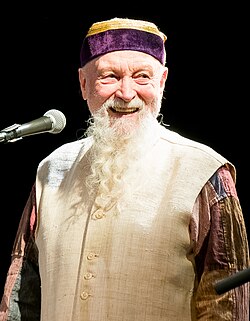Terry Riley Quote
Related Quotes
The global population of Earth are involved in the following corporate government experiments: The long term effects of - 1. Nuclear bomb fallout radiation. 2. Man-made wireless radio frequency (RF) r...
Steven Magee
Tags:
abnormally, adaptation, aircraft, airplanes, atmosphere, atom, bodies, bomb, chemical, chemtrails
Many obese people spend a significant amount of their energy on suppressing the urge to tell some of the people who are staring at them that they do not eat as much and as frequently as they seem to.
Mokokoma Mokhonoana
Tags:
angular, anorexia, anorexic, aphorism, aphorisms, aphorist, aphorists, as thin as a rake, beefy, beer bellied
About Terry Riley
Terrence Mitchell Riley (born June 24, 1935) is an American composer and performing musician best known as a pioneer of the minimalist school of composition. Influenced by jazz and Indian classical music, his work became notable for its innovative use of repetition, tape music techniques, improvisation, and delay systems. His best known works are the 1964 composition In C and the 1969 album A Rainbow in Curved Air, both considered landmarks of minimalism and important influences on experimental music, rock, and contemporary electronic music. Subsequent works such as Shri Camel (1980) explored just intonation.
Raised in Redding, California, Riley began studying composition and performing solo piano in the 1950s. He befriended and collaborated with composer La Monte Young, and later became involved with both the San Francisco Tape Music Center and Young's New York collective, the Theatre of Eternal Music. A three-record deal with CBS in the late 1960s brought his work to wider audiences. In 1970, he began intensive studies under Hindustani singer Pandit Pran Nath, whom he often accompanied in performance. He has collaborated frequently throughout his career, most extensively with chamber ensemble the Kronos Quartet and his son, guitarist Gyan Riley.
Raised in Redding, California, Riley began studying composition and performing solo piano in the 1950s. He befriended and collaborated with composer La Monte Young, and later became involved with both the San Francisco Tape Music Center and Young's New York collective, the Theatre of Eternal Music. A three-record deal with CBS in the late 1960s brought his work to wider audiences. In 1970, he began intensive studies under Hindustani singer Pandit Pran Nath, whom he often accompanied in performance. He has collaborated frequently throughout his career, most extensively with chamber ensemble the Kronos Quartet and his son, guitarist Gyan Riley.
